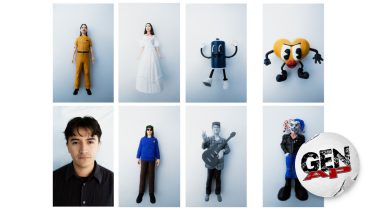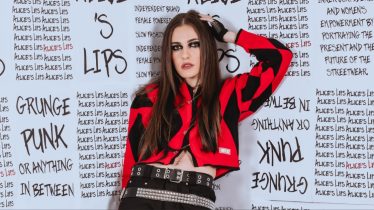
With Rat Saw God, Wednesday find beauty in the mundane
Wednesday’s Karly Hartzman still remembers; the time her friend got their stomach pumped after getting too stoned off Benadryl, the dresser laying on the side of the road, the person drinking “piss-colored bright yellow Fanta.”
The songs from their sublime new album, Rat Saw God (out today via Dead Oceans), spill over with these types of vignettes, rooted in the American South and the band’s time on the road. Listening to the record feels like touching the same soil, even when hundreds of miles span between you. Opener “Hot Rotten Grass Smell” conjures a distinct image from the jump, where the stench hits your nostrils just as quickly as the wailing guitars, and it’s easy to picture the “rain-rotted house” that appears in “Quarry.” You may know one just like it. It’s divine songwriting — the kind that places importance on the hazy, mundane moments as much as the formative ones. No story is too small, and it’s the subtleties that help round out the bigger picture. When coupled with their melding of shoegaze fury with country savvy, Wednesday’s ability to balance the bleak and the bright spots across 10 tracks feels extraordinary.
Read more: GEL’s “hardcore for the freaks” is as inclusive as it is aggressive
Ahead of Rat Saw God’s release, the Wednesday guitarist/vocalist explored the biggest misconceptions about country music, being inspired by writers with a deep sense of place, and the Asheville crew’s explosive new record.
I hear so many reference points in your music, but I know that doesn’t necessarily equate to what you listened to as a kid. Who was your gateway band?
My friend made me a mixtape in high school that had My Bloody Valentine and Cocteau Twins on it, and that exploded my mind. I had never heard anything like that, and I feel like I was a latecomer to that stuff. I just didn’t feel like I got basic access to alternative or indie music until high school. Greensboro, where I’m from, was just like pop punk. That’s what you listen to, that’s the bands you saw, that was everything. I never really felt it in the way that I knew was possible with music. But when I heard that stuff, I was like, “Finally, [this is] what I was looking for.”
I saw that you said “Chosen to Deserve” was your attempt at recreating a Drive-By Truckers song, and the band are mentioned again in “Bath County.” How did you first start listening to them?
My parents put on a little bit when I was a kid, but I didn’t know anything about outlaw country music, which is more what they’re involved in. Jake [Lenderman] showed me them, my partner who plays guitar in the band. That’s the kind of band that you just get obsessed with because they have so much to dig into. They have a million albums, and every album is good, and every lyric is amazing. It feels like I’ve been listening to their music all my life, but it’s been more recent.
Your parents also appear in the “Chosen to Deserve” music video. What did they think about the new record?
They really like it, which is cool. My parents are like 50 times more excited about everything happening with the band than I am because I feel like I have to keep an even keel or else I’m gonna freak out. I need to not burn out on excitement because it’s a delicate thing, and I’m trying not to get a big head. But my mom is just like, “It’s amazing!” [Laughs.] It took them a second to adjust to what we were doing because it wasn’t what they raised me on, especially the noisy stuff. But I think they understand it now and understand why I’m choosing noisier sounds to express certain feelings.
What’s the Asheville music scene like?
A lot of the entry-level stuff here is basement house shows and parties because you’re in either high school or college, and that’s where you’re playing. So I think there’s still a lot of house show venues that are doing that. But the main midsize venue closed during the pandemic, and that’s where me and Xandy [Chelmis], our steel player, worked, and we were able to transition from house shows into venue settings through that venue. Now there’s not really a space that size that makes it easy to transition. It’s already hard making a career from the South. You’re not gonna have a record executive come to your show in Asheville. But it’s even harder now that there’s not this transitional space for bands in between to learn.
You write with such a distinct sense of place in mind for your songs, in a way that really makes me feel like I’m there. Hopefully this doesn’t sound too lofty, but it reminds me a lot of how someone like Joan Didion wrote about California. Do you have a favorite Didion book or quote?
I read Slouching Towards Bethlehem a while ago, but it’s really flattering that you say that comparison because people are so prone to think I’m accomplishing something with my writing in spite of being from the South. So the fact that you’re associating me inherently with someone who is known for being an intellectual is really refreshing because it’s not in spite of being from the South. Because I’m from the South, I have access to writers. There’s so many people that have written about the South in a way that is so poetic and true to the life here. I really like Joan Didion, but I don’t relate to the West Coast because I’ve never really been there. I’ve been there on tour, but that’s not really being there. Harry Crews is an obvious example of someone from the South that is writing about the South that I’m inspired by. It’s a different level of immersion. They’re all writing about place in their own way, but it hits different when it’s coming from where you’re from.
Tell me one of the biggest joys about being in a relationship with your own bandmate.
I guess just knowing that our lives are happening in tandem, in a way. It’s like a symbiotic [relationship]. Good things happening to us individually is good things happening to us as a pair. So I think it just feels good to be excited about each other’s accomplishments in a way that’s really unconditional. Also, collaboration creatively does something for a relationship that’s hard to describe. There’s a closeness and intimacy. It’s no small feat letting someone into your world romantically, and then in the creative space, it’s another level of trust. You have to surpass that.
What do you think people misconstrue about country music?
I think a lot of people think it’s limited to pop country. There’s a lot of subgenres, in the same way there are subgenres to rock music. There’s a lot of subgenres to country music and a lot of different styles of performing it. But I think a lot of people, when they hear that one thing, completely just count out the rest of the genre. But outlaw country music, that’s country music made by people with ideals that are so similar to DIY punk and anarchist, and it’s almost more interesting than punk music because it’s saying political shit in a place like the South. So, there is country music like that that people don’t know about, and then there’s totally different sectors of recordings and sounds. I feel like people that are into Alex G would be into Townes Van Zandt, you know? It’s a similar ethos. I think it just becomes [the same] to people when really there’s so much variation.
Wednesday appeared in Alternative Press’ spring 2023 issue as part of our 10 Topics series, which you can grab here.









